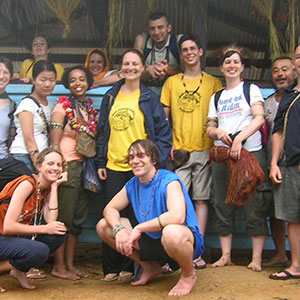Talent pool: Sarah Parsons, chair, JETAA UK
Now in its 27th year, the Japan Exchange and Teaching (JET) Programme has welcomed over 55,000 people from 62 countries to deliver grassroots international exchange between Japan and other nations. This column will feature former JETs, both in the UK and Japan, who keep the idea of fostering mutual understanding firmly at heart.
I was on the JET Programme from 1995 to 1997 in Ojima-machi, Gunma Prefecture, and then stayed in the area for another year to work for a private English-language school in Isesaki-shi and Kiryu-shi.
This experience sparked a passion for Japan that has shaped my life since, and on which I have built my business.
Since part of the JET job description is to promote grassroots internationalisation, I spent a lot of time with local Japanese people and their families.
I went on work trips, attended family ceremonies—including weddings—played in an orchestra, taught local community lessons and socialised.
This immersion helped me to experience a side of Japan that cannot be accessed on a holiday or business trip. I was in Japan’s inaka (countryside) during pre-internet days, and learned the language and culture out of necessity.
Being a foreigner and a woman, I found it difficult to be accepted and, thus, had to adapt. Some of Japan’s cultural elements—avoiding open conflict and preferring harmony—worked well for me, although it was hard to negotiate social hierarchies and obligations.
I found JET to be an intense and amazing experience, but sometimes isolating and tiring. It was time to go home to Mansfield in the East Midlands.
After the shock of seeing people fighting over Christmas crackers at a local supermarket, in stark contrast to the order and group consciousness of Japan that I had come to appreciate, I headed to London to work for the Japan Local Government Centre.
Part of my role was to help seconded staff adapt to their life and jobs in the UK, and we got to know London together. I learned invaluable lessons about working with the Japanese, as well as the difficulties they have adapting to our culture and aligning Japanese management and local staff.
My connection with Japan continued to be a major part of my job and social life for the next three years as I was also heavily involved in the London Chapter of the JET Programme Alumni Association.
Then family life called. I moved back to the East Midlands to the market town of Newark-on-Trent, had children and trained to be a teacher. My Japan connection could have ended there, but it didn’t.
Japan’s recent economic resurgence and emphasis on globalisation—in particular Abenomics and its women-related policies dubbed Womenomics—as well as thoughts of the 2020 Olympic and Paralympic Games, made me want to become involved again.
So it was that I started my own business, Japan In Perspective, which combines my passions, Japan experience and invaluable insights. My work is varied and exciting. I conduct global leadership and development courses for Japanese executives working overseas, to help them understand the individualistic nature of our corporate culture.
At the same time, for UK firms, I offer initial market research, facilitation of market entry and communications consultancy. I speak at seminars, panel discussions and trade forums.
In addition, I am the National Chair of the JET Programme Alumni Association of the UK (JETAA UK), a voluntary organisation of former JETs with more than 6,000 registered members.
It receives support both from the Embassy of Japan in the UK and the Council of Local Authorities for International Relations (CLAIR), a Japanese government agency.
In a recent article for exporttojapan.co.uk, I refer to the powerful, international network that is JETAA UK as “Japan’s secret ninjas”, since in almost every Japan-related profession in the UK, there are former JETs who want to remain involved with Japan.
The shared grassroots Japan-experiences of our members are harnessed through social, cultural, educational and professional activities.
As the chairperson, I oversee these activities across the UK and engage professionally with organisations—including the BCCJ—to raise our profile and liaise with chapters worldwide.
Our committee attends various engagements and receptions, with ties to the Japanese and British governments, as well as Japan-related organisations and businesses. In addition, we engage with the UK–Japan 21st Century Group, address JET Programme conferences in Japan, and meet visiting Japanese ministers.
It was an honour to have been invited to an official dinner during Prime Minster Shinzo Abe’s recent visit. Although I didn’t get a chance to speak to him. I was also ready to let him know that the JET Programme’s goal of promoting globalisation is one in which I, and many other former JETs, remain passionately involved.






